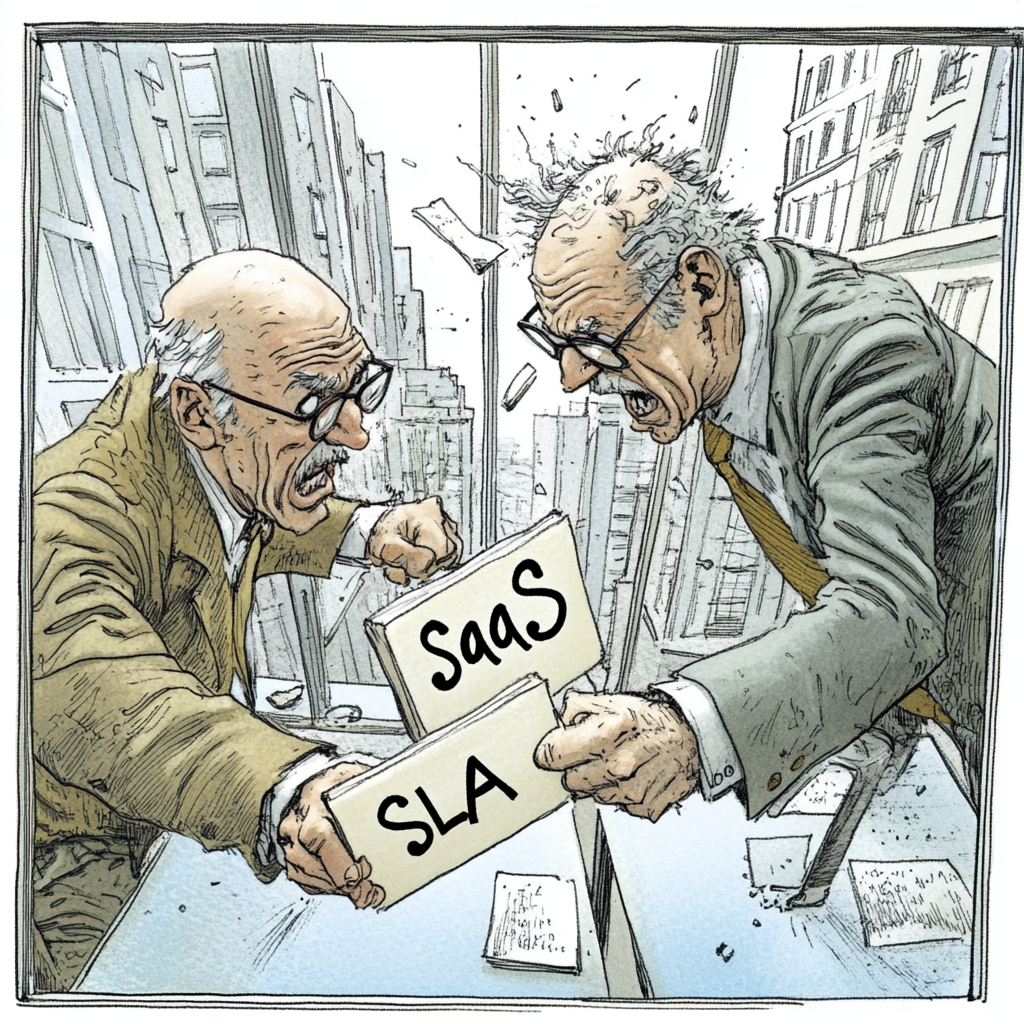What happens when your SaaS provider goes down?
Picture this: You’re midway through your workday, relying on your go-to SaaS tool—say, ChatGPT this morning in the UK—to help draft an important document or power your workflow, and then, out of nowhere, it’s offline. Frustration builds, and so does the realization: This downtime isn’t just an inconvenience. It’s a violation of their uptime guarantee—a core promise enshrined in their Service Level Agreement (SLA), gilded with gold, encrusted with jewels, and littered with broken promises.
Now, before you start throwing a hissy fit or hammering out a verbose and pissed-off email (using your own brain ’cause your favorite LLM is still offline), let’s unpack what this really means for you as a user, what it means for the provider, and how Large Language Models (LLMs) like ChatGPT, Claude, and Gemini can do more than simply process your emails. They can be your ace in the hole for navigating this SaaS SLA slamdance.
When SaaS Goes Offline, Dollars Are on the Line
Most reputable SaaS providers promise a certain level of uptime—often 99.9% or better—to reassure their users that service interruptions will be rare. When they fail to meet this promise, SLAs typically allow users to claim service credits or, in some cases, financial compensation. Sounds fair, right? Well, not so fast. The process of requesting those credits can be a labyrinth of legalese and bureaucratic BS.
What many users don’t realize is that the real pain for the SaaS provider isn’t just the downtime; it’s the tsunami of emails, phone calls, opened support tickets, and social media posts screaming customer dissatisfaction, not to mention the subsequent administrative headaches. Every user who files for credits represents time, money, and goodwill slipping through their fingers. And if those users are vocal—or influential—the reputational damage can far outweigh the financial cost.
Enter the LLM Cavalry
So, where does an LLM fit into this picture? Let me count the ways.
1. Interpreting the SLA: Who Owes What?
SLAs are notoriously dense. Even if you have a legal background, deciphering who’s liable, what constitutes a breach, and what remedies are available can be a Herculean task. An LLM can read through that 4,000-word SLA, distill its contents into a concise summary, and highlight the specific clauses that apply to your situation. Think of it as having a very patient, albeit imperfect, legal assistant sitting right beside you.
2. Crafting Your Credit Request
Drafting a professional, airtight request for service credits can make all the difference between a swift resolution and weeks of back-and-forth emails. An LLM can help structure your request, ensuring it includes the necessary details: dates of the outage, the promised uptime percentage, and the relevant SLA clauses. It won’t replace your due diligence, but it’s a powerful head start.
3. Setting the Stage for Negotiation
Some providers might push back on your claim, arguing technicalities or suggesting that the downtime wasn’t significant enough to warrant compensation. Having an LLM summarize the SLA’s obligations and your rights gives you a strong foundation to counter their arguments effectively.
The Bigger Picture: Demystifying SLAs
Of course, this is just the beginning. The same tools that help you handle a single service outage can be leveraged to tackle a broader challenge: understanding SLAs and similar agreements before you’re ever in a pinch. My next blog post will dive deeper into how LLMs can:
- Spot hidden restrictions that could trip you up (like those petty limitations on reusing EDGE-generated security tokens in your own SaaS app).
- Clarify the differences between an SLA and a Software User Agreement (SUA).
- Identify obligations and risks you might otherwise overlook.
The Reality Check
Before we get too far into the weeds, let’s acknowledge the limitations. LLMs are not lawyers. They make mistakes. They hallucinate (who doesn’t?). But, and this is my point, they’re still miles (kilometers?) better than blindly wading through legal jargon or relying on questionable advice from your non-lawyer friend who claims they “know a guy.” Even a flawed summary can be a solid launchpad for your own due diligence.
So, the next time your SaaS provider goes offline, leaving you wondering whether you’re entitled to compensation, remember: You’re not alone. You’ve got a powerful ally in your corner, ready to read, interpret, and guide. And of course I’m writing this post using my own custom blog-writing GPT. Why aren’t you?
Note:
ChatGPT, by OpenAI, does not have a specific Service Level Agreement (SLA) like some other services. However, OpenAI does have Service Terms that govern the use of their services, including ChatGPT. These terms outline the rights and responsibilities of both OpenAI and the users, but they do not provide specific uptime guarantees or service credits like a traditional SLA. OpenAi is still promising that they will have a proper SLA soon. Maybe they could use an LLM to speed things along.



